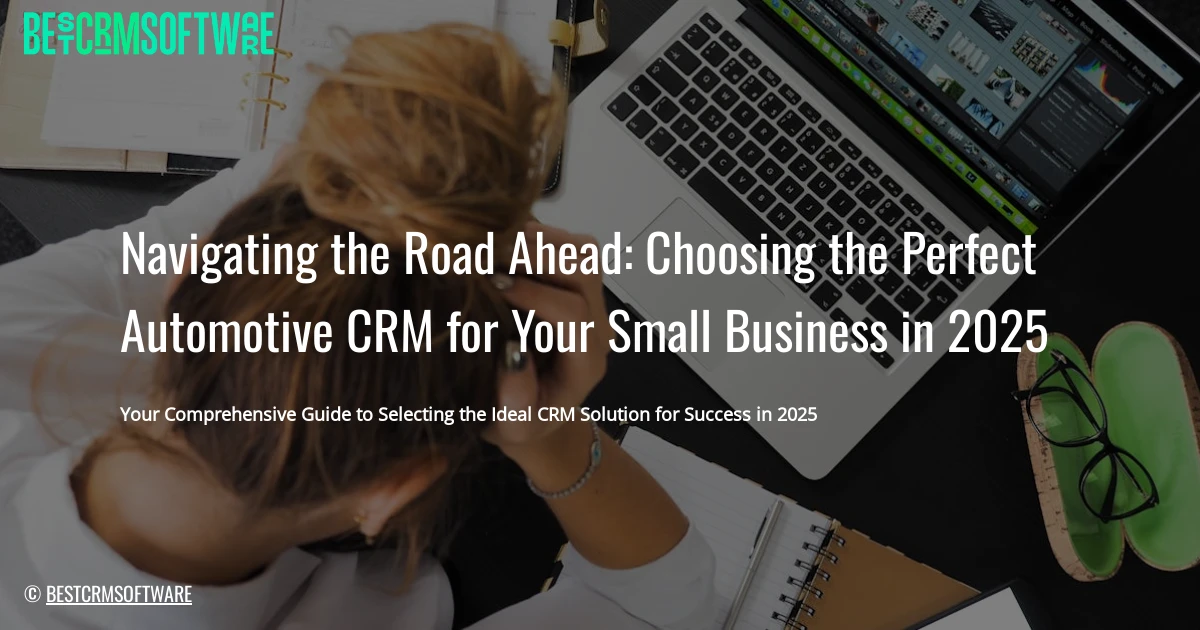Your Comprehensive Guide to Selecting the Ideal CRM Solution for Success in 2025
Laying the Groundwork: Pre-Selection Essentials
Before diving headfirst into the vast pool of automotive CRM options, it’s crucial to lay a solid foundation for your decision-making process. This involves understanding your unique dealership needs, anticipating the evolving landscape of customer expectations, and setting clear objectives for CRM implementation. Here’s a breakdown of three key areas to focus on:
1. Defining your dealership’s specific needs and challenges:
- What are your current pain points? Are you struggling with lead management, customer engagement, or sales pipeline tracking? Identify areas where an automotive CRM could significantly improve your efficiency and effectiveness.
- What are your specific goals? Do you aim to increase customer retention, boost sales conversions, or improve customer service satisfaction? Clearly defining your goals will guide you toward a CRM solution that aligns with your aspirations.
- What are your current systems and processes? Understanding your existing infrastructure and workflows is critical in choosing a CRM that seamlessly integrates with your current setup and doesn’t require disruptive changes.
- What is your budget and resources? Determine a realistic budget and identify the resources you have available for implementation and ongoing management of a new CRM system.
2. Understanding the evolving landscape of customer expectations in 2025:
- Embrace personalized experiences: Customers expect tailored communication and service experiences, personalized based on their individual needs and preferences. A CRM should facilitate this through robust data capture and targeted marketing tools.
- Prioritize omnichannel interactions: Customers navigate multiple touchpoints in their journey – from websites and social media to text messaging and video calls. A CRM needs to seamlessly connect all these channels to provide a unified customer experience.
- Focus on transparency and trust: Customers are more discerning than ever. A CRM should equip your dealership to provide clear and consistent communication, track service history, and ensure secure data handling for building lasting trust.
- Empower self-service and instant access: Customers crave convenience. A CRM should provide access to self-service portals, FAQs, and immediate access to information relevant to their queries, freeing up your team to handle complex requests.
3. Setting clear objectives for CRM implementation and ROI:
- Identify key metrics for success: Establish quantifiable metrics to measure the impact of your CRM on key business aspects such as lead conversion rates, customer lifetime value, and service appointment bookings.
- Define ROI goals: Set realistic expectations for return on investment by projecting the anticipated revenue increases and cost reductions associated with using a CRM.
- Outline a detailed implementation plan: Develop a clear roadmap for implementation, including training programs for staff, data migration procedures, and a system testing and roll-out schedule.
By thoughtfully addressing these pre-selection essentials, you equip yourself with the clarity and insight needed to confidently navigate the world of automotive CRM solutions and select the ideal partner to empower your dealership’s success in 2025 and beyond.
Must-Have Features for 2025 and Beyond
The automotive industry is evolving rapidly, with technology playing an increasingly prominent role. As you embark on your search for the perfect automotive CRM for your small business in 2025, certain features become essential for success. Here are the must-haves that will set your business apart:
Key features to look for in 2025 (AI, Automation, Omnichannel):
- Artificial Intelligence (AI): AI-powered solutions will become increasingly critical in automating repetitive tasks, personalizing customer experiences, and even predicting future behavior. Look for CRMs with AI features like intelligent chatbots, automated lead scoring, and personalized marketing campaigns.
- Automation: Streamline your workflows by automating routine tasks. CRMs should be equipped with tools to automatically assign leads, schedule appointments, send follow-up emails, and manage tasks. Automation saves time and resources, allowing you to focus on higher-value activities.
- Omnichannel Integration: Today’s customers expect a seamless experience across all touchpoints. Your chosen CRM should provide a centralized platform for managing customer interactions regardless of the channel. This includes email, SMS, social media, website, and even in-dealership interactions.
Balancing advanced functionality with user-friendliness and intuitiveness:
While advanced features are essential, they must be accompanied by a user interface that’s both easy to navigate and understand. Your staff needs to feel comfortable using the CRM. Search for platforms with intuitive interfaces, robust training resources, and a strong customer support system.
Ensuring seamless integration with existing dealership systems (DMS, etc.):
Avoid creating silos of data by ensuring your CRM integrates flawlessly with existing systems. Look for CRMs that can smoothly connect with your Dealer Management System (DMS) and other essential software. This integration will prevent duplication of efforts, ensure data consistency, and provide valuable insights through consolidated information.
Investing in a CRM with these features will not only enhance your customer interactions but also equip your business with the tools needed to thrive in the competitive landscape of 2025. By staying ahead of the curve, you’ll be poised for growth and success in the years to come.

© Jopwell
Finding the Right Fit: Types of Automotive CRMs
As you embark on your search for the perfect Automotive CRM, understanding the various options available is crucial. Here’s a breakdown of three key areas to explore:
1. Researching Industry-Specific CRM Solutions Tailored for Auto Dealerships:
- Specialised Functionality: Industry-specific CRMs are built with the unique needs of automotive dealerships in mind. They offer features tailored to areas like service scheduling, inventory management, lead generation, and sales pipeline tracking.
- Pre-Built Integrations: Many of these CRMs have seamless integrations with common automotive systems such as dealer management systems (DMS), vehicle inventory management, and finance platforms. This streamlined connectivity reduces data duplication and saves you time.
- Automotive Expertise: These solutions often come with dedicated support teams familiar with automotive best practices. They can offer insights on how to maximize your CRM to drive efficiency and sales.
2. Exploring CRM Options Designed Specifically for Small Business Scalability:
- Affordable Pricing Models: Small businesses require CRM solutions that fit within their budget. Look for flexible pricing models based on the number of users, features, or even transaction volume.
- User-Friendly Interface: Ease of use is critical for small teams with limited technical expertise. A CRM with intuitive navigation and clear dashboards will ensure smooth adoption and ongoing use.
- Scalable Features: While starting small, you need a system that can grow with your business. Ensure your chosen CRM can easily accommodate additional users, data storage, and advanced features as your business expands.
3. Considering the Benefits of Cloud-Based CRM Solutions for Flexibility:
- Remote Access and Collaboration: Cloud-based CRMs grant you and your team access from any location with internet connectivity, facilitating seamless collaboration and communication, especially for a mobile workforce.
- Automatic Updates and Maintenance: No need to worry about software updates or system maintenance – cloud providers handle everything behind the scenes.
- Lower upfront Costs: Cloud-based options typically require less upfront investment compared to traditional on-premise solutions, making them an attractive option for small businesses.
- Data Security and Backups: Cloud providers are typically equipped with robust security measures and automated data backups, providing peace of mind regarding the safety and accessibility of your critical information.
By carefully examining these different categories, you can identify CRM solutions that perfectly align with your small business needs, allowing you to navigate the road ahead with confidence and efficiency.
Budgeting Wisely: CRM Pricing and ROI
Navigating the vast landscape of CRM solutions requires more than just finding the best features. Budgeting wisely is crucial, and it starts with understanding the different pricing models and their potential hidden costs.
Understanding CRM pricing models and potential hidden costs:
CRMs typically employ various pricing models, including:
- Subscription-based: This is the most common model, with monthly or annual fees based on the number of users or features.
- Per-user: This model charges a fixed price per user accessing the CRM system.
- Tiered pricing: This model offers various packages with increasing features and functionality at a higher price.
Be wary of potential hidden costs that may not be readily apparent. These include:
- Implementation fees: Costs for installing, configuring, and training users on the CRM.
- Integration costs: Integrating with existing business software (e.g., accounting, email marketing) can incur extra charges.
- Customization: Adding specific features or tailoring the system to your unique needs can also add to the cost.
Assessing the scalability of pricing plans for future business growth:
The ideal CRM will not only meet your current needs but also adapt as your business grows. This means considering:
- Pricing elasticity: Can you seamlessly upgrade your plan to accommodate more users, data storage, or advanced functionalities?
- Predictable costs: Ensure that your CRM provider provides clear and transparent pricing for scaling up.
- Flexibility: Some CRM solutions offer custom pricing models, which can provide flexibility based on specific business requirements.
Calculating the potential return on investment (ROI) of CRM adoption:
Investing in a CRM system requires a strategic mindset. It’s crucial to calculate the potential ROI to ensure you reap the benefits.
To do this, consider:
- Quantify cost savings: Measure how much time and resources you currently spend on managing customer interactions. The CRM will likely automate these tasks, generating significant cost savings.
- Boost revenue: Track increased sales, higher conversion rates, and better customer engagement driven by a robust CRM system.
- Improve efficiency: Calculate the potential reduction in operational inefficiencies through data-driven insights, streamlined workflows, and personalized communication.
By thoroughly evaluating pricing models, considering scalability, and assessing potential ROI, you can make an informed decision to find the perfect automotive CRM that fits your budget and fuels your future success.

© Andrea Piacquadio
From Research to Shortlist: Evaluating Potential Providers
The journey to finding the ideal automotive CRM begins with thorough research and evaluation. Here’s how to meticulously curate your shortlist of potential vendors:
1. Defining Your Needs: Before diving into the sea of options, take a deep dive into your own needs. Identify specific goals:
- Do you primarily need lead capture and management?
- Are you looking to streamline service scheduling?
- Do you want to implement customer loyalty programs?
This initial introspection will provide you with a clear roadmap for selecting a system that aligns perfectly with your dealership’s objectives.
2. Leveraging the Power of Research: Now, armed with your needs, explore the vast automotive CRM landscape. Online resources like G2, Capterra, and Software Advice provide comprehensive vendor comparisons, user reviews, and detailed feature breakdowns.
3. Diving Deep into Reviews and Reports: Pay close attention to customer feedback. User reviews are an invaluable window into the strengths and weaknesses of different systems. Look for trends and recurring themes:
- What are customers praising the system for?
- Are there common pain points or challenges mentioned?
- Does the vendor prioritize responsiveness and customer support?
Industry reports and articles from trusted sources like Forbes or Automotive News can offer valuable insights into emerging trends, popular choices, and overall vendor rankings.
4. Comparative Analysis: Features, Pricing, and Support: With a handful of potential vendors on your radar, embark on a detailed comparative analysis. Consider factors like:
- Core Features: Does the platform encompass essential functions like lead management, inventory tracking, sales pipeline automation, and service scheduling?
- Pricing: Explore subscription models, per-user costs, and potential add-on fees. Seek transparency and clarity in pricing structures to avoid any surprises down the line.
- Customer Support: Gauge the vendor’s responsiveness through live chat, email support, and phone accessibility. Explore their documentation and knowledge base to assess the learning curve and overall usability of the platform.
By meticulously evaluating each vendor based on your specific requirements and a deep dive into customer experiences, you’ll be well-positioned to choose a solution that not only meets your needs but also fosters growth and success for your dealership in the dynamic landscape of 2025.
Test Driving for Success: Free Trials and Demos
Choosing the right automotive CRM is a crucial decision for any small business. It’s a commitment you shouldn’t take lightly. The key is to avoid making a choice based on glossy marketing materials alone. You need to experience the CRM firsthand and see how it performs in your real-world scenario. This is where free trials and demos become essential tools.
The importance of hands-on experience before commitment cannot be overstated. A demo or free trial lets you interact with the system directly, giving you a much clearer picture than any marketing pitch ever could. You can get a feel for how the CRM works in your specific environment, and understand its capabilities beyond the basic functionalities highlighted in product descriptions.
Utilizing free trials and demos allows you to:
- Test drive CRM functionalities – See how easily you can add leads, track customer interactions, manage sales pipelines, schedule appointments, send email campaigns, and generate reports. You’ll discover if the features you need are accessible and user-friendly.
- Evaluate the user interface, navigation, and ease of use. This is especially important in a fast-paced industry like automotive. Does the system feel intuitive? Can you quickly find the information you need? Are tasks simple to complete?
- Assess compatibility with your existing systems – You need a CRM that seamlessly integrates with your existing software and hardware. Test its integration with your existing CRM or ERP system to ensure a smooth workflow.
Free trials and demos empower you to confidently choose a CRM that fits your business needs. It’s like taking a test drive before making a purchase, giving you the power to choose a system that not only works for you but truly works with you. This investment in a little exploration now can pay dividends in efficiency and growth for years to come.

© Anna Shvets
Beyond the Features: Assessing Vendor Support
The right Automotive CRM can be a game-changer for your small business, but a great CRM is more than just a collection of features. Solid vendor support is crucial to maximizing your investment and achieving your long-term goals.
As you navigate the vast landscape of Automotive CRM options, don’t neglect to ask probing questions about vendor support. This will help you understand how the chosen solution will truly fit your business needs and set you up for success.
Here are some key areas to explore:
1. Asking the right questions about customization and support:
- How flexible is the CRM’s customization? Can it be tailored to fit your unique workflows and sales processes?
- What support resources are available? Does the vendor offer dedicated support teams, online resources, knowledge bases, or tutorials?
- How quickly can you expect support? What are the response times for different types of support inquiries?
- What is the process for submitting feature requests and getting updates? A responsive vendor will actively engage with your suggestions and implement improvements over time.
2. Inquiring about data migration, training, and ongoing assistance:
- What are the data migration processes and timelines? Is there dedicated support for ensuring a smooth and efficient transition of existing data?
- What training and onboarding options are available? Will you have access to user guides, webinars, or personalized training sessions to ensure everyone is comfortable with the new system?
- Does the vendor offer ongoing support beyond initial implementation? Are there dedicated resources for ongoing assistance, regular updates, and feature upgrades?
3. Understanding the vendor’s approach to data security and compliance:
- What data security measures are in place? Ask for details about encryption protocols, data backups, access controls, and disaster recovery plans.
- Does the CRM comply with relevant industry regulations? Make sure the chosen solution meets your compliance needs for data privacy, GDPR, and other industry standards.
By digging into these critical areas, you’ll gain a deeper understanding of the overall value proposition offered by each vendor. This crucial step can save you time and frustration down the road and set the foundation for a long-lasting, productive partnership with your Automotive CRM provider.
Learning from Others: Customer Reviews and Case Studies
Choosing the right automotive CRM is a critical investment for any small business. It’s not just about finding a solution with the right features, but one that genuinely meets the unique needs of your dealership. Before you make a decision, leveraging the experiences of others can provide invaluable insights.
The significance of user reviews and testimonials:
- Real-world feedback: Reviews and testimonials offer unfiltered feedback from actual CRM users. This provides a more accurate picture of the software’s strengths and weaknesses than any marketing materials can offer.
- Addressing specific needs: User reviews can highlight how the CRM tackles specific challenges relevant to your dealership, such as managing appointments, inventory, or customer communication.
- Revealing potential issues: Look for recurring negative reviews to identify common pitfalls or issues that could be dealbreakers for your business.
Identifying potential red flags and dealbreakers in vendor feedback:
- Recurring complaints: If several users report similar negative experiences, it suggests a systemic problem with the software or vendor.
- Lack of customer support: Negative reviews often point towards unresponsive customer service or technical difficulties.
- Feature gaps: If the CRM lacks essential features repeatedly mentioned in reviews, it might not be the right fit for your needs.
- Ease of use: Poor user experience and complex interfaces can cause frustrations, impacting your team’s productivity.
Looking for vendors with a proven track record in the automotive industry:
- Specialized features: Seek out vendors specifically targeting automotive dealerships. Their offerings should cater to your unique business demands and regulations.
- Industry expertise: A dedicated automotive CRM provider possesses deep industry knowledge, understands your workflows, and offers tailored solutions.
- Case studies: Successful case studies from similar automotive businesses demonstrate the effectiveness of the CRM in real-world scenarios, building confidence in the vendor’s abilities.
By carefully studying user reviews, case studies, and vendor feedback, you can avoid common pitfalls and select a CRM that aligns with your goals, streamlines your operations, and enhances customer satisfaction for years to come.

© Andrea Piacquadio
Seamless Transition: Planning for Implementation
The excitement of choosing the perfect automotive CRM for your small business can quickly turn into anxiety if you don’t plan for a smooth implementation. Moving your data and processes from existing systems to a new CRM is a critical step, and it needs careful consideration to minimize disruption and maximize efficiency. Here’s what you need to keep in mind:
- Ensuring a smooth transition from existing systems to the new CRM. This isn’t just about moving data. You need to consider workflows, processes, and team training. Your new CRM should integrate seamlessly with your existing systems, including your website, accounting software, and other critical business tools.
- Understanding the vendor’s data migration process and timeline. Ask for detailed information about the data migration process. How does the vendor handle sensitive data like customer information and sales records? What are the timelines for transferring information? Do they offer pre-migration data cleansing services to ensure accuracy?
- Minimizing disruption to daily operations during CRM implementation. Implement the CRM in phases. This allows for training and testing while keeping core operations running smoothly. Identify and prioritize crucial workflows and implement those first. Provide thorough training to your team, including access to online resources, webinars, and dedicated support from the vendor.
Remember, a seamless implementation depends on careful planning and communication. By taking the time to understand the vendor’s processes and developing a structured plan, you can ensure a smooth transition to your new CRM and begin leveraging its powerful features without losing valuable productivity.
Empowering Your Team: Training and User Adoption
Investing in a robust Automotive CRM is only half the battle. Ensuring successful implementation hinges on user buy-in and effective training. This section focuses on empowering your team to seamlessly integrate the new system into their daily workflow:
Effective Strategies for Training Staff on Utilizing the New CRM System:
- Tailored Training: Avoid a one-size-fits-all approach. Different departments will have varying levels of technical proficiency and interaction with the CRM. Develop tailored training programs catering to specific roles, incorporating interactive demonstrations, role-playing, and hands-on exercises.
- Phased Rollout: Start with a pilot program, introducing the CRM to a smaller group and allowing them to provide feedback before full implementation. This iterative approach minimizes disruption and facilitates smoother adoption across the board.
- Interactive Resources: Invest in readily available resources like user manuals, online tutorials, and video demonstrations accessible 24/7. Provide opportunities for ongoing learning through workshops, webinars, and knowledge base access.
- Mentorship and Buddy System: Assign experienced staff to mentor their colleagues, ensuring a constant resource for support and troubleshooting. Encourage a peer-to-peer learning environment, where colleagues can share best practices and tips.
Highlighting the Benefits of CRM Adoption to Encourage User Engagement:
- Increased Productivity and Efficiency: Show how the CRM streamlines tasks, reduces redundancies, and frees up time for high-value activities like personalized customer interactions and strategic planning.
- Enhanced Customer Experience: Emphasize how the CRM empowers staff to provide better service through comprehensive customer history, personalized communications, and proactive follow-ups.
- Improved Reporting and Analytics: Showcase the actionable insights gained from CRM data for making informed decisions about sales strategies, marketing campaigns, and overall business growth.
- Empowering the Sales Team: Illustrate how the CRM gives them access to powerful tools like lead management, pipeline tracking, and sales automation, enhancing performance and closing more deals.
Establishing Clear Channels for Ongoing Support and Troubleshooting:
- Dedicated Support Desk: Create a centralized point of contact for any technical issues or system inquiries. Implement a ticketing system for tracking requests and ensuring prompt resolutions.
- Regular Feedback Sessions: Schedule periodic meetings to gather user feedback on the system’s functionality, identify any roadblocks, and address concerns proactively.
- Internal Champions: Designate staff members as “CRM Champions” within each department, acting as knowledgeable ambassadors for the new system and fostering continuous adoption within their respective teams.
Remember, successful CRM implementation relies on a culture of active user engagement and continuous improvement. By focusing on training, emphasizing benefits, and providing readily accessible support, you can equip your team to leverage the power of your new automotive CRM for long-term success.

© Andrea Piacquadio
Data-Driven Success: Tracking CRM Performance
Investing in an Automotive CRM is a significant step, and maximizing its potential requires understanding its impact on your business. This is where data analysis comes into play.
By measuring the success of CRM implementation through key performance indicators (KPIs), you gain invaluable insights into how well the CRM is serving your needs. Tracking improvements in lead generation, customer retention, and sales conversions becomes the key to unlocking true value from your investment.
Here’s how you can leverage data for continuous optimization:
- Define your KPIs: Identify the metrics that are most relevant to your business goals. Examples include:
- Lead conversion rate: This tracks the percentage of leads that convert into paying customers.
- Customer acquisition cost (CAC): This measures the cost of acquiring a new customer.
- Customer lifetime value (CLTV): This represents the total revenue you expect to generate from a customer over their relationship with your business.
- Average deal size: This reflects the average value of sales made.
- Monitor performance over time: Regularly review your KPIs and compare them to previous periods to track progress and identify areas for improvement.
- Analyze data and identify trends: Explore patterns in your data to understand what drives success. For example, are certain sales channels more effective than others? Which customer segments are most receptive to your marketing campaigns?
- Make data-driven adjustments: Use your findings to make informed decisions about your CRM strategy. Adjust your marketing efforts, refine your sales processes, or optimize your communication with customers.
Continuously analyzing data and making adjustments to optimize CRM utilization is essential for long-term success. By embracing a data-driven approach, you can ensure that your CRM becomes an indispensable tool for growing your small automotive business in 2025 and beyond.
Power of Personalization: CRM for Targeted Marketing
In today’s crowded automotive market, simply throwing generic marketing campaigns at customers is unlikely to resonate. The key to success lies in personalized experiences, and a powerful Automotive CRM is your weapon of choice. Here’s how:
- Leveraging CRM data to create targeted marketing campaigns:
- Your CRM holds a wealth of information about your customers, including their demographics, vehicle preferences, purchase history, and service records. This data becomes gold when used to segment your audience and craft highly targeted marketing campaigns.
- Instead of broadcasting the same offer to everyone, you can tailor campaigns based on specific interests and needs. Imagine a targeted email campaign showcasing the latest electric vehicles for eco-conscious customers, or a personalized service reminder for those approaching their next oil change.
- Personalizing customer interactions based on individual preferences and purchase history:
- Your CRM allows you to personalize customer interactions at every touchpoint. From greeting a returning customer by name to recommending accessories based on their vehicle, small touches make a big difference.
- Imagine a chatbot on your website proactively suggesting services based on a customer’s recent purchase or addressing concerns about specific features. This personalized experience creates a sense of value and strengthens the customer relationship.
- Nurturing leads through automated email sequences and follow-ups:
- Don’t let potential customers slip through the cracks! Your CRM can automate personalized email sequences that guide leads through the buyer journey, offering information, scheduling test drives, and even promoting financing options.
- These automated emails ensure consistent follow-up, keep your brand top-of-mind, and nurture the customer relationship until they’re ready to purchase.
With its ability to analyze data and personalize communication, an automotive CRM empowers you to understand your customers on a deeper level, tailor marketing strategies to their individual needs, and ultimately convert more leads into loyal customers. In 2025, the businesses who master the art of personalization will be the ones leaving their competitors in the dust.

© Christina Morillo
Enhancing the Customer Experience: CRM as a Relationship Builder
The automotive industry is experiencing a dramatic shift, demanding a more personalized and responsive approach to customer engagement. Automotive CRM software emerges as a vital tool, not just for managing customer information, but for building lasting relationships and driving loyalty.
Here’s how the right automotive CRM empowers you to elevate the customer experience:
- Understanding the customer journey and optimizing each touchpoint with CRM data: By collecting and analyzing customer data throughout their lifecycle, you gain insights into their needs, preferences, and purchase habits. This allows you to tailor marketing messages, personalize interactions, and deliver relevant offers at every stage, from initial research to service appointments.
- Improving communication and responsiveness to customer inquiries and concerns: A CRM system streamlines communication channels, enabling efficient handling of customer queries and concerns across all platforms. This allows for quick response times, personalized communication, and a more positive customer experience.
- Building stronger customer relationships through personalized experiences: Leveraging the wealth of data collected, your CRM allows you to personalize every interaction. From personalized email campaigns to tailored service recommendations, the CRM provides the tools to offer customized experiences that demonstrate genuine understanding and care, fostering stronger bonds with your customers.
The benefits extend beyond individual customer experiences:
- Improved retention rates: By addressing customer needs effectively and building lasting relationships, you increase customer retention, driving repeat business and loyalty.
- Enhanced lead generation and sales conversions: A comprehensive understanding of customer behavior allows you to target potential buyers more effectively, leading to a more efficient lead generation and conversion process.
- Increased revenue and profitability: By fostering customer loyalty, optimizing operations, and making data-driven decisions, you can unlock significant gains in revenue and profitability.
As the automotive industry navigates the road ahead in 2025, focusing on building strong customer relationships will be crucial for success. An effective automotive CRM acts as a catalyst for this transformation, providing the tools and insights to cultivate a more personalized and engaging customer experience, driving business growth and customer satisfaction in the years to come.
Efficiency at its Best: Automating Dealership Operations
In the fast-paced world of automotive sales, efficiency is key. The right CRM can empower your small business to operate smoothly and effortlessly, leaving you more time to focus on what truly matters – your customers.
Here’s how an automotive CRM can revolutionize your dealership operations:
- Automating routine tasks like appointment scheduling and service reminders. Say goodbye to manual calendar entries and missed follow-ups. With automation, your CRM will seamlessly schedule appointments, send timely service reminders, and ensure customers never slip through the cracks. This frees up your staff for more strategic tasks and enhances customer satisfaction.
- Streamlining sales processes with automated lead qualification and distribution. Let the CRM do the heavy lifting when it comes to nurturing leads. Automated lead qualification helps you identify the most promising prospects, while intelligent distribution routes leads to the most suitable sales team member. This ensures every opportunity is handled effectively and increases your closing rate.
- Freeing up staff time to focus on higher-value activities like customer interactions. With repetitive tasks off your team’s plate, you can empower them to dedicate more time to building genuine connections with your customers. From personalized interactions to insightful follow-ups, fostering stronger relationships becomes the priority, driving loyalty and positive word-of-mouth referrals.
By automating essential processes, your dealership can operate more efficiently, improve staff productivity, and provide an enhanced customer experience – all essential ingredients for long-term success.

© Pixabay
The Omnichannel Advantage: CRM for Seamless Customer Engagement
In today’s interconnected world, customers expect a consistent and seamless experience, no matter how they choose to interact with your business. This is where an effective CRM system comes into play, empowering you to navigate the complexities of the modern automotive landscape with grace.
The key to unlocking this seamless engagement lies in embracing the power of an omnichannel strategy. This involves effectively managing customer interactions across various channels – from phone calls and emails to social media messaging – all within the same CRM platform.
Here’s how a robust CRM solution empowers you to achieve this omnichannel excellence:
- Managing customer interactions across various channels (phone, email, social media) within the CRM: Instead of navigating disparate systems for different communication channels, a comprehensive CRM unifies your interactions in one centralized location. This allows for easier tracking, analysis, and most importantly, a more holistic understanding of each customer’s journey.
- Providing a seamless and consistent customer experience across all touchpoints: By integrating all customer data into a single system, your CRM allows for consistent communication across channels. This ensures a unified brand experience, no matter if the customer is booking a service appointment via email or inquiring about a specific car feature on your Facebook page.
- Leveraging data to understand customer behavior and preferences: The wealth of customer information collected across various channels can be analyzed to glean insights into customer preferences, buying patterns, and even potential future needs. This valuable data empowers you to tailor your marketing efforts, service offerings, and overall communication strategy for each individual customer, maximizing your impact and satisfaction.
By adopting a CRM solution that champions omnichannel integration, your small business can provide a superior, personalized customer experience that builds trust, loyalty, and ultimately, lasting relationships. In an increasingly competitive landscape, this omnichannel advantage is crucial to staying ahead of the curve and driving continued success.
Data-Driven Insights: Unlocking Business Intelligence
In the competitive automotive landscape of 2025, having a clear understanding of your customer base, sales trends, and operational efficiency is no longer just a good idea – it’s a necessity. The right automotive CRM system empowers you to turn raw data into actionable intelligence, propelling your small business forward.
Here’s how data becomes your most valuable asset:
- Utilizing CRM data to gain insights into sales trends, inventory management, and customer preferences:
- Identify your top-selling models and understand what drives customer interest. This data can inform your inventory strategy, ensuring you always have popular models on hand.
- Analyze customer purchasing patterns, understanding who buys what and when. This enables you to create targeted marketing campaigns and personalized sales approaches.
- Uncover preferences regarding financing, trade-in values, and add-ons. Tailor your offerings to cater specifically to what customers value.
- Identifying areas for improvement in dealership operations and customer service:
- Track key metrics like lead conversion rates, appointment scheduling efficiency, and customer satisfaction scores. This data highlights opportunities for streamlining processes and improving customer experiences.
- Analyze feedback from surveys and reviews, identifying potential pain points and areas needing improvement in communication, service, or dealership facilities.
- Compare performance against industry benchmarks and competitor analysis, providing a clearer picture of areas where you can outperform the competition.
- Making data-driven decisions to optimize profitability and growth:
- Optimize your pricing strategies based on customer demand and competitive market data.
- Allocate your marketing budget effectively by identifying the most successful channels and tailoring campaigns for different customer segments.
- Identify underperforming departments or products, allowing you to make adjustments to increase efficiency and profitability.
In essence, your automotive CRM doesn’t simply store data – it unlocks a wealth of business intelligence, empowering you to make informed decisions, enhance your operational efficiency, and ultimately, drive sustainable growth. This data-driven approach positions you to confidently navigate the road ahead, achieving greater success in the dynamic automotive landscape.

© Alexander Suhorucov
Future-Proofing Your Dealership: Staying Ahead of the Curve
The automotive industry is constantly evolving, and staying ahead of the curve is crucial for any small business seeking long-term success. Choosing an automotive CRM today is not just about meeting your current needs; it’s about investing in a solution that will grow with you and adapt to the changing landscape of tomorrow. This means considering future-proofing your CRM investment, staying ahead of emerging technologies and trends, and exploring the potential of artificial intelligence (AI) and machine learning (ML).
1. Staying ahead of emerging technologies and trends in the automotive CRM landscape:
The automotive CRM landscape is in constant flux, driven by rapid advancements in technology and changing customer expectations. This means you need to be vigilant in researching new features and functionalities, exploring platforms that offer:
- Integration with emerging technologies: The rise of electric vehicles, connected car technology, and the expanding influence of the internet of things (IoT) are driving new opportunities. Ensure your CRM is equipped to manage data from these sources and provide insights for seamless integration into your business operations.
- Focus on personalized customer experiences: Customers expect personalized experiences across every touchpoint, and your CRM should be able to deliver on that expectation. Look for solutions that offer personalized communication, targeted marketing, and omnichannel engagement features.
- Seamless integration with other business applications: From inventory management systems to finance platforms, your CRM needs to integrate seamlessly with your existing software suite. This allows for efficient data flow and eliminates manual processes, saving valuable time and resources.
2. Considering future-proofing your CRM investment for long-term success:
The cost of transitioning to a new CRM platform can be significant. By choosing a solution that adapts and grows with your business, you minimize future disruption and ensure a long-term investment:
- Scalability and flexibility: Choose a CRM platform that can scale with your business needs as you grow. Consider cloud-based solutions that offer greater scalability and flexibility compared to traditional on-premise installations.
- Regular updates and feature enhancements: Look for CRM providers committed to continuous innovation, offering regular updates and feature enhancements to ensure your system remains relevant and equipped to handle evolving industry needs.
- Vendor reliability and long-term support: Evaluate vendor reliability, track record of success, and level of customer support. Selecting a reputable and reliable provider guarantees that you have access to ongoing technical assistance and a supportive team to navigate the future.
3. Exploring the potential of artificial intelligence (AI) and machine learning (ML) in CRM:
AI and ML are revolutionizing the way businesses operate, and CRM is no exception. Integrating AI and ML into your CRM system can bring about substantial benefits:
- Improved data analysis and predictive capabilities: Leverage AI to extract valuable insights from customer data, helping predict customer behavior, optimize marketing campaigns, and streamline sales processes.
- Automated workflows and process efficiency: Automate tasks such as lead scoring, customer segmentation, and communication scheduling, freeing up valuable time for your sales team to focus on more complex tasks.
- Personalized customer interactions: Leverage AI to deliver highly personalized customer interactions, based on their unique needs and preferences. This fosters greater customer satisfaction and builds loyalty.
As you navigate the ever-changing landscape of automotive CRM, remember that a future-proof approach will ensure you reap the long-term benefits of your investment. Embrace emerging technologies, stay adaptable, and embrace the potential of AI and ML to drive your dealership to greater success.
Proof in Action: Case Studies and Success Stories
The road to success for any small automotive business can be paved with challenges, but a powerful CRM can be your reliable GPS, guiding you toward greater efficiency, customer satisfaction, and profitability. Let’s dive into some real-world examples of how small automotive businesses have leveraged CRMs to achieve tangible results, proving its value as a strategic investment:
1. The Independent Dealership: Maximizing Service Appointment Scheduling
- The Challenge: A small, family-owned dealership struggled to efficiently manage service appointments. Scheduling conflicts and lost leads due to ineffective communication were commonplace.
- The Solution: Implementing a CRM with integrated appointment scheduling functionalities enabled the dealership to:
- Streamline booking process with online appointment booking, reminders, and confirmations.
- Centralize all customer and vehicle data, ensuring accurate service history and personalized communication.
- Optimize staff availability by visualizing booked slots, reducing no-shows and maximizing technician utilization.
- The Outcome: Appointment booking increased by 25% with significantly fewer cancellations. This translated into a 10% boost in service revenue within a year.
2. The Used Car Dealer: Boosting Lead Conversion with Targeted Marketing
- The Challenge: A used car dealer lacked effective methods to nurture leads and convert them into paying customers. Sales conversions were inconsistent and marketing efforts lacked personalized touch.
- The Solution: By leveraging CRM analytics, the dealer segmented customer leads based on their preferences, vehicle interest, and buying stages. This enabled:
- Targeted marketing campaigns with customized emails, SMS, and social media content.
- Real-time lead tracking and progress, allowing for prompt follow-up and personalized communication.
- Performance analysis of marketing campaigns, optimizing resources for greater return on investment.
- The Outcome: Lead conversion rates saw a dramatic 30% increase, translating to significant growth in vehicle sales and higher profit margins.
3. The Auto Repair Shop: Fostering Customer Loyalty with Proactive Engagement
- The Challenge: An independent repair shop struggled with customer retention, with a significant portion opting for larger chains.
- The Solution: Utilizing a CRM with customer engagement features, the repair shop implemented:
- Personalized loyalty programs with discounts, exclusive offers, and rewards for repeat customers.
- Automated reminders for vehicle maintenance, proactive outreach, and tailored recommendations.
- Detailed service history records, allowing for proactive communication and personalized consultations.
- The Outcome: Customer retention rate increased by 20%, with positive word-of-mouth referrals boosting business reputation and client base.
These success stories demonstrate the transformative power of a robust CRM, making it a powerful tool for navigating the automotive market and propelling your small business towards greater success. Embrace the future of your business and empower yourself with the insights and efficiency a CRM provides!

© Andrea Piacquadio
The Road Ahead: CRM for a Changing Automotive World
The automotive landscape is undergoing a seismic shift, fueled by the rise of electric vehicles (EVs), autonomous driving technology, and a growing focus on sustainability. This revolution presents both opportunities and challenges for dealerships and auto service providers, requiring a fundamental reassessment of strategies and tools. This is where Customer Relationship Management (CRM) becomes critical, acting as a vital navigator through this evolving terrain.
The role of CRM in navigating the evolving automotive landscape, including electric vehicles (EVs) and autonomous driving.
- Adapting to new customer profiles: The EV revolution is attracting a new breed of environmentally conscious buyers, often tech-savvy and digitally adept. CRM can help dealerships understand these evolving customer demographics, their preferences, and their unique purchasing journey, allowing for tailored marketing and service experiences.
- Tailoring service and maintenance: EVs and autonomous vehicles demand different service requirements compared to traditional gasoline-powered cars. CRM can help dealerships manage maintenance schedules, track component lifecycles, and provide specific service solutions for these evolving vehicles, ensuring customer satisfaction and loyalty.
- Embracing data-driven insights: The complex technology behind EVs and autonomous vehicles generates an immense amount of data. CRM platforms can harness this data to gain actionable insights into customer behavior, vehicle performance, and emerging market trends, enabling smarter decision-making.
Adapting your CRM strategy to cater to the changing needs of customers and market demands.
- Personalized customer experiences: Customers are seeking personalized experiences in a crowded marketplace. CRM can help dealerships leverage customer data to offer targeted promotions, provide relevant service reminders, and curate personalized communication across various channels, from email and SMS to mobile apps and social media.
- Frictionless omnichannel engagement: Consumers today move seamlessly between online and offline channels. CRM enables seamless transitions throughout the customer journey, ensuring consistency in information, communication, and service across touchpoints.
- Data-driven decision-making: CRM platforms can analyze customer data to understand preferences, purchasing trends, and competitive landscape insights. This enables dealerships to make informed decisions on inventory management, pricing, marketing campaigns, and customer outreach strategies.
Leveraging CRM to stay competitive and thrive in the face of disruption.
- Boosting customer loyalty: By nurturing customer relationships, providing personalized experiences, and offering value-added services, CRM can contribute to increased customer retention, ultimately reducing reliance on fleeting short-term sales and driving sustained business growth.
- Strengthening sales performance: With advanced analytics and targeted marketing features, CRM empowers dealerships to effectively reach and convert potential customers, leading to increased sales volumes and market share dominance.
- Optimizing operational efficiency: CRM solutions streamline processes such as lead management, service appointment scheduling, and inventory management, resulting in improved efficiency and productivity, saving time and resources for dealership teams.
The automotive world is evolving at an unprecedented pace. Those who embrace the transformative power of CRM and leverage its capabilities to adapt and innovate will be best positioned to thrive in the new era. By staying agile, embracing customer-centric strategies, and harnessing the power of data-driven decision-making, dealerships can pave their path towards success on the road ahead.
Drive into the Future: Empowering Your Dealership with the Right CRM
The road ahead for small automotive businesses in 2025 is paved with opportunities. However, navigating this complex landscape requires the right tools and strategies. A robust automotive CRM is more than just a fancy piece of software; it’s your trusted companion on this journey to growth and customer satisfaction.
Taking action and embarking on the journey to find the perfect automotive CRM for your small business is crucial. Think of it as acquiring the engine that will power your dealership’s success. The right CRM will streamline your operations, improve customer engagement, and provide the vital insights you need to make informed decisions.
Remember, a well-chosen CRM can be a game-changer. It empowers you to maximize efficiency, cultivate lasting customer relationships, and achieve your business objectives. A seamless flow of information between departments, insightful customer analytics, and automated marketing campaigns will unlock your dealership’s full potential.
Investing in a CRM system is investing in the future success of your dealership. It’s about future-proofing your business by embracing technology that helps you adapt, grow, and thrive. With the right CRM at your side, you can confidently drive towards a future brimming with possibilities.

© Emmy E
Resources
HOW TO CHOOSE THE RIGHT CRM SYSTEM FOR BUSINESS – BINMILE
THE BEST SIMPLE CRMS FOR 2024 – EASY & BASIC CRMS – ZENDESK
GLOBAL AUTOMOTIVE CUSTOMER RELATIONSHIP MANAGEMENT MARKET …
TIPS FOR FINDING THE PERFECT CRM SAAS FOR YOUR BUSINESS – RINGY
BEST AUTOMOTIVE CRM SOFTWARE COMPARISON & REVIEWS 2024 – PAGE 3
5 CLOUD BASED SOFTWARES FOR YOUR CONSTRUCTION BUSINESS – YOUTUBE
<!–
–>

